14 Jun 2013 | Uncategorized
To be an artist today means facing some age-old restrictions — whether they are economic, or the controversies that arise from clashing with society’s norms and standards.Women, however, face specific challenges when it comes to artistic freedom. The UN Special Rapporteur in the field of Cultural Rights, Farida Shaheed, recently released a report that captured some of these challenges:
“Restrictions on artistic freedoms may target some categories of the population more specifically. Women artists and audiences are at particular risk in some communities, and are prohibited from performing arts altogether, from solo performances before mixed audiences, or from performing with men. In a number of countries, many women making a living as artists, or wishing to engage in artistic careers, particularly in the areas of cinema, theatre, dance and music, continue to be labelled as “loose” or “prostitutes.”
Shaheed also emphasises the importance of artists having their work in public spaces: “the Special Rapporteur is convinced that freedom of artistic expression and creativity cannot be dissociated from the right of all persons to enjoy the arts, as in many cases restrictions on artistic freedoms aim at denying people access to specific artworks. Hence removing creative expressions from public access is a way to restrict artistic freedom.”
Add in religious or conservative values — and that only makes things a bit more tricky. For female artists who are also Muslim, there can be enormous challenges in bringing their work to the public space, and there have been some projects aimed at amplifying the stories and works of Muslim women. Projects like the Birmingham-based Ulfah Arts targets faith-based communities, who aren’t as engaged with the arts, and other projects like like Muslima — created by the International Museum of Women — showcase the artworks of Muslim women around the world in a virtual exhibition.
In some cases, restrictions on artistic freedom aren’t a question of space, but rather problems with a community’s notions of honour and propriety. Norwegian artist Deeyah, who made a documentary about the 2006 “honour killing” of a young Kurdish woman called Banaz Mahmood, said in an interview with the Free Word Centre that the value placed on “honour” cripples the freedom of expression of women in communities where it is a form of social currency:
This collective sense of honour and shame has for centuries confined our movement, freedom of choice and restricted our autonomy. You cannot be who you are; you cannot express your needs, hopes and opinions as an individual if they are in conflict with the greater good and reputation of the family, the community, or the collective. If you grow up in a community defined by these patriarchal concepts of honour and social structures, these are the parameters you are expected to live by.
Index has asked three Muslim women to write about the challenges they’ve faced as artists:
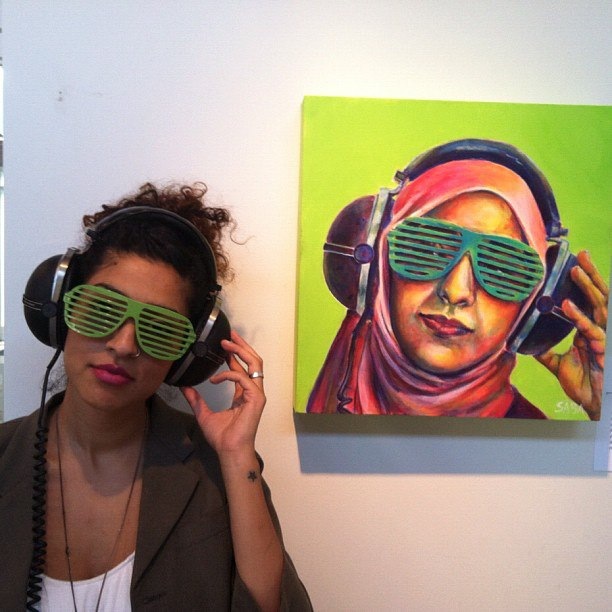 I am Pakistani, and like many other Pakistanis around me, I was strongly encouraged to become a doctor — because doing so would grant me both social status and financial security. In my family, and for most other Pakistanis I know, daughters and sons are expected to take both their education and careers seriously. A career in art seemed like an impractical and even wasteful pursuit — because it is neither financially secure, nor is it viewed as respectable in many circles. To top it all off, I had also had to consider whether or not I was risking eternal damnation by painting portraits (frowned upon by some Muslims). Before I began painting Muslim women, I was encouraged to explore my religious background through my art, and even capitalise on it, because Islam is currently the site of a controversial and political debate. But what I noticed is that the demand that exists is for images of Muslim women that illustrate the already existing narrative in the West. Through my work, I try to give a nuanced image based in truth, without passing judgment — which is a much harder sell, even though those are the stories about women that we need to experience.
I am Pakistani, and like many other Pakistanis around me, I was strongly encouraged to become a doctor — because doing so would grant me both social status and financial security. In my family, and for most other Pakistanis I know, daughters and sons are expected to take both their education and careers seriously. A career in art seemed like an impractical and even wasteful pursuit — because it is neither financially secure, nor is it viewed as respectable in many circles. To top it all off, I had also had to consider whether or not I was risking eternal damnation by painting portraits (frowned upon by some Muslims). Before I began painting Muslim women, I was encouraged to explore my religious background through my art, and even capitalise on it, because Islam is currently the site of a controversial and political debate. But what I noticed is that the demand that exists is for images of Muslim women that illustrate the already existing narrative in the West. Through my work, I try to give a nuanced image based in truth, without passing judgment — which is a much harder sell, even though those are the stories about women that we need to experience.
Saba Barnard, painter
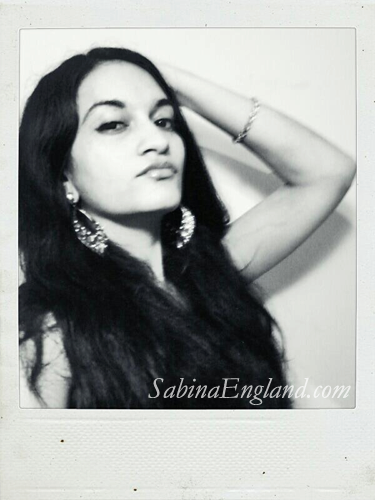 Being Muslim and deaf, and coming from a culture (Indian/South Asian) where family pressure is a big part of creating one’s future, I constantly struggle as an artist, writer, and filmmaker. Previously I’ve faced opposition from my parents, who did not want me to participate in the performing arts. Fortunately they have come around and now they support me, but they still don’t understand my passion for the arts — which is my driving force. They do not understand that my life is about creating art, breathing the air of Mother Earth, and thanking Goddess (Allah). I have faced hostility and rejection from dominantly white and western theatres and film festivals uninterested in my female-centric, woman of colour, deaf-perspective stories, films, and expressions. I never know if my works are rejected because I am Muslim, or if they’re rejected because a deaf woman of colour’s stories are so alien and foreign to the people considering them. There are fewer deaf people than Muslims — and I guess my perspective is very alien in many ways, but it doesn’t help to have my voice kept out of the mainstream. Rejection especially hurts, because my background isn’t really represented — and it would surely be a break from the white males who seem to constantly receive praise and space for uninspiring, homogenous crap. There’s also resistance from other Muslims (usually Muslim males) who think that I should shut up, be quiet, and not be seen or heard. I am so tired of it all. Now, I just do my own things and I publish my works through my own channels. That way, I can keep writing, creating, performing, filming what I want — and no one can silence or reject me.
Being Muslim and deaf, and coming from a culture (Indian/South Asian) where family pressure is a big part of creating one’s future, I constantly struggle as an artist, writer, and filmmaker. Previously I’ve faced opposition from my parents, who did not want me to participate in the performing arts. Fortunately they have come around and now they support me, but they still don’t understand my passion for the arts — which is my driving force. They do not understand that my life is about creating art, breathing the air of Mother Earth, and thanking Goddess (Allah). I have faced hostility and rejection from dominantly white and western theatres and film festivals uninterested in my female-centric, woman of colour, deaf-perspective stories, films, and expressions. I never know if my works are rejected because I am Muslim, or if they’re rejected because a deaf woman of colour’s stories are so alien and foreign to the people considering them. There are fewer deaf people than Muslims — and I guess my perspective is very alien in many ways, but it doesn’t help to have my voice kept out of the mainstream. Rejection especially hurts, because my background isn’t really represented — and it would surely be a break from the white males who seem to constantly receive praise and space for uninspiring, homogenous crap. There’s also resistance from other Muslims (usually Muslim males) who think that I should shut up, be quiet, and not be seen or heard. I am so tired of it all. Now, I just do my own things and I publish my works through my own channels. That way, I can keep writing, creating, performing, filming what I want — and no one can silence or reject me.
Sabina England, filmmaker & stage performance artist
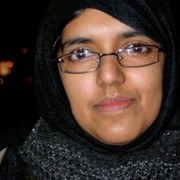 The two biggest restrictions placed on Muslim women wanting to enter the arts are the reactions of the community to the arts, and self-censorship. For example, while most of the reactions to my play about a Muslim girl finding “the one” were positive, one female friend made her disapproval clear to me. She said, for a “Muslim girl”, I shouldn’t have written such a play — because it’s forbidden to talk about sex before marriage openly. This is all the more reason why we should write about it — it’s an expression of opinion. There’s also a double standard: when Muslim males write about sex, it’s OK. But as soon as a Muslim woman writes about sex, she is labelled a “slut.” And it’s because of this judgment that many choose self-censorship instead of speaking up. Shouldn’t the arts be about being true to oneself? I don’t want to be labelled for writing about religion, politics, and terrorism. There’s more to me than these three things. Even with pressure, Muslim women are slowly overcoming these restrictions — but communities need to be more open-minded. Hopefully, Muslim women can eventually be judged solely for the work, rather than what’s “expected.”
The two biggest restrictions placed on Muslim women wanting to enter the arts are the reactions of the community to the arts, and self-censorship. For example, while most of the reactions to my play about a Muslim girl finding “the one” were positive, one female friend made her disapproval clear to me. She said, for a “Muslim girl”, I shouldn’t have written such a play — because it’s forbidden to talk about sex before marriage openly. This is all the more reason why we should write about it — it’s an expression of opinion. There’s also a double standard: when Muslim males write about sex, it’s OK. But as soon as a Muslim woman writes about sex, she is labelled a “slut.” And it’s because of this judgment that many choose self-censorship instead of speaking up. Shouldn’t the arts be about being true to oneself? I don’t want to be labelled for writing about religion, politics, and terrorism. There’s more to me than these three things. Even with pressure, Muslim women are slowly overcoming these restrictions — but communities need to be more open-minded. Hopefully, Muslim women can eventually be judged solely for the work, rather than what’s “expected.”
Mediah Ahmed, playwright
14 Jun 2013 | In the News
GLOBAL
Q&A: “Media Concentration Is an Attack on Democracy”
“We have to understand that information, above all else, is a social service. If we lose sight of that dimension we begin to regulate it as merchandise, but the state has many other obligations, such as to guarantee freedom,” said Frank La Rue.
(European Daily Express)
AFRICA
MFWA Highlights Major Threats to Press Freedom in West Africa
Armed conflicts, violent activities of fundamentalist groups and drug cartels and general intolerance for free expression among a number of governments have been highlighted as major threats to the advancement of press freedom in the West African region.
(AllAfrica.com)
AUSTRALIA
Success for Vivid but lingering fears over censorship
Vivid festival has ended as a spectacular success with a record-breaking attendance in Sydney, but behind the scenes the relationship between the popular event and photojournalism festival Reportage has soured amid accusations of censorship and breaches of contract.
(The Guardian)
IRAN
Hacker Says Iranian Censorship Can Be Bypassed
An Israeli hacker says it’s easy to bypass the tight Iranian government censorship wrapped around media and the Internet as 50 million citizens head for the polls this Friday.
(Arutz Sheva 7)
Iran’s presidential vote not free, fair: UN rights envoy
Iran’s presidential election has been neither free nor fair as Tehran has silenced journalists and opposition leaders in the run up to Friday’s vote, a United Nations human rights investigator said in Spain. Ahmed Shaheed, UN special rapporteur on the human rights situation in Iran, warned in March that he was concerned that the outcome of the election would lack legitimacy because dozens of Iranian journalists were behind bars and hundreds of political prisoners remained in custody.
(Business Recorder)
RUSSIA
New Russian Law Makes Publication of Information on Gay Rights Illegal
On June 11 the Russian parliament passed a bill against “homosexual propaganda” that effectively outlaws gay rights rallies and bans informational or pro-gay rights material from publication in the media or on the Internet. Violators of the law will risk heavy fines and censorship and, in the case of a media outlet, risk being shut down. It had near unanimous support, passing in a 436-to-0 vote, with only one abstention.
(Tech President)
UNITED KINGDOM
LRC keeps up pressure on libel reform
Finance Minister Sammy Wilson’s decision to veto a law to strengthen protections on free speech has been vigorously defended by the DUP, following fresh criticism.
(The Bookseller)
Yesterday, an MP stood up in parliament and threatened a newspaper with censorship. Where’s the outrage?
Imagine if an MP stood up in parliament and told, say, an anarchist magazine to stop publishing cartoons mocking government officials. Imagine if that MP then said that if the magazine didn’t comply with this request, the government would “step in and legislate” in order to physically and brutally prevent it from publishing the offending material. There’d be outrage, right?
(The Telegragh)
DUP defends libel law veto
Finance Minister Sammy Wilson’s decision to veto a law to strengthen protections on free speech has been vigorously defended by the DUP, following fresh criticism.
(News Letter)
Twitter: #FreeSpeech or #EthicalCleansing?
There has been a storm of somewhat overblown hysteria about the US and UK authorities secretly spying on citizens’ private emails and postings on social-media websites. Yet there is far less debate about a much more open attempt to police free speech online in the UK, through the public pursuit, arrest and prosecution of those deemed to have said something offensive or outrageous on Twitter or Facebook.
(Spiked)
UK libel reform fight ‘isn’t over yet’
British scientists should not celebrate victory in their libel reform fight just yet, according to the campaigners who have spent years pushing for change.
(Nature)
UNITED STATES
The worst crimes against the First Amendment
Since 1992, The Thomas Jefferson Center for the Protection of Free Expression has celebrated the birth and ideals of its namesake by calling attention to those who in the past year forgot or disregarded Jefferson’s admonition that freedom of speech “cannot be limited without being lost.”
(Missoula Independent)
Freedom of Speech Lives On
“Holding Colleges Responsible” is the latest example in a slew of articles – many of them quoting the Foundation for Individual Rights in Education – that are meant to alarm anyone with a voice, and the author’s use of selective quotes out of the Education Department’s Office for Civil Rights’s response to FIRE only fans the flame.
(Inside Higher Ed)
How Colleges Label Protected Speech as ‘Harassment’–And Why the DOJ and ED Have Made Matters Worse
One would think the Departments of Justice and Education would be mindful of citizens’ constitutional rights. Unfortunately, recent developments fly in the face of that assumption: New regulations from the DOJ and ED significantly harm student and faculty free speech rights.
(Huffington Post)
Ban on “gruesome images” threatens free speech
For those of us who worry about the vitality of free speech in the “land of the free,” the news this week isn’t good. On June 10, the U.S. Supreme Court refused to review a Colorado appeals court decision banning anti-abortion activists from displaying “gruesome images” of mutilated fetuses that might be seen by children.
(GazetteXtra)
Atheist group sues Orange schools, claiming censorship
An atheist group that distributed pamphlets in 11 Orange County high schools last month filed a lawsuit today against Orange County Public Schools, claiming censorship.
(Orlando Sentinel)
Obscenity is protected free speech, NY attorneys say
A 22-year-old Connecticut man arrested for writing obscenities and “Tyranny” on his speeding ticket payment claims in a federal lawsuit that his free speech rights were violated.
(WHAM 13)
Gov. Rick Perry: ‘Freedom of religion doesn’t mean freedom from religion’
Current Republican governor of Texas, Rick Perry attacked nonreligious Americans during a signing of the “Merry Christmas” bill this week, insinuating that Americans don’t have the right to be secular.
(Examiner)
13 Jun 2013 | Europe and Central Asia
A resolution that was adopted today in Geneva extends the mandate of Miklos Haraszti, a Special Rapporteur on human rights situation in Belarus, for one more year. Andrei Aliaksandrau reports
The UN Human Rights Council expressed its “deep concern at continuing violations of human rights in Belarus, which are of a structural and endemic nature, and also at the systemic and systematic restrictions on human rights, especially in the case of the freedoms of association, of assembly, and of opinion and expression, as well as the guarantees of due process and fair trial.”
The Council strongly urged the Belarusian government to “immediately and unconditionally release and rehabilitate all political prisoners, and to rehabilitate those who have already been released, to address, through comprehensive, transparent and credible investigations, reports of torture and ill-treatment by law-enforcement officials, and to put an immediate end to the arbitrary detention of human rights defenders and political opponents, arbitrary travel bans and other policies aimed at intimidating representatives of the political opposition and the media, as well as human rights defenders and civil society.”
Related: The first rule of dictator club…
The resolution extends the mandate of a Special Rapporteur on human rights situation in Belarus and urges the government of the country to cooperate fully with the Miklos Haraszti, including by providing him access to visit Belarus. Previously, he was denied a visa to enter the country, and it is likely still to be the case in future. Mikhail Khvostov, the Permanent Representative of Belarus to the UN Office in Geneva, reiterated just before the voting that Belarus does not recognize the mandate of the Special Rapporteur. He also described the resolution proposed by the European Union as an “act of aggression against the United Nations,” BelaPAN News Agency reported.
Twenty-six countries voted in favour of the resolution, while three countries voted against it and 18 more abstained. The attempts of delegations of several “like-minded” states to prevent a critical resolution on Belarus, failed.
“This is a significant resolution that allows keeping the alarming human rights situation in Belarus in focus of international community. I hope the authorities of the country change their aggressive attitude towards the Special Rapporteur and start cooperating with him to bring positive changes to the situation,” Tatsiana Raviaka, a representative of the Human Rights Centre “Viasna”, told Index.
13 Jun 2013 | China, Digital Freedom
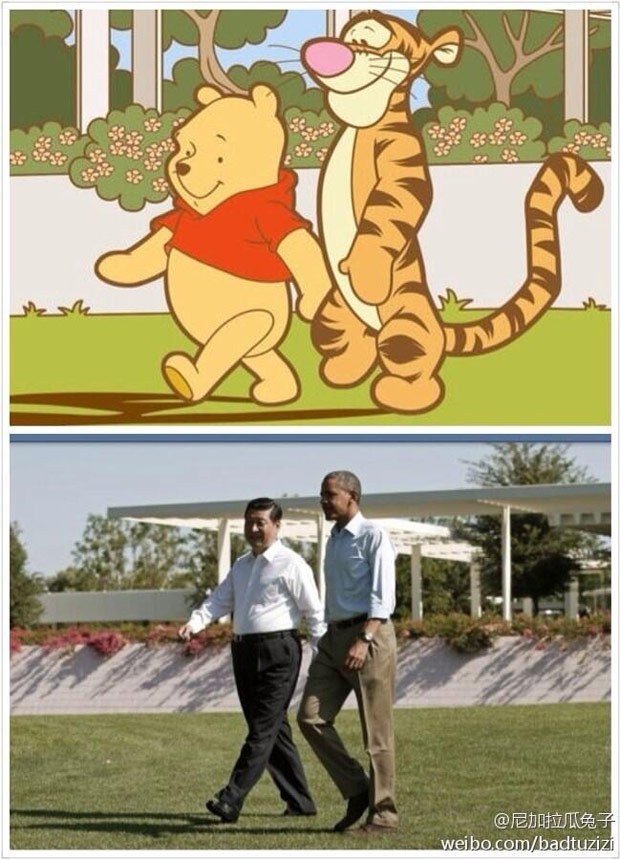 China has censored an image of Winnie the Pooh strolling with Tigger, after it went viral on popular Chinese microblogging site, Sina Weibo.
China has censored an image of Winnie the Pooh strolling with Tigger, after it went viral on popular Chinese microblogging site, Sina Weibo.
The image was circulated after bloggers noticed the similarities between a photo snapped this week of President Barack Obama and Chinese premier Xi Jinping and an illustration of the cartoon characters.
China’s censors are known for their lack of a sense of humour: earlier this month, censors deleted a photoshopped version of a famous picture showing a single protester standing before a row of tanks in Tiananmen Square, where the tanks were replaced with large rubber ducks.
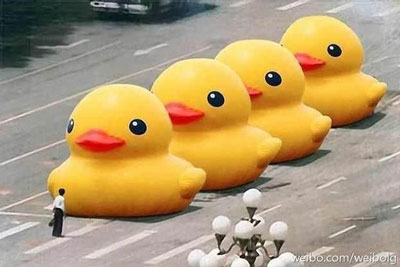
Sara Yasin is an Editorial Assistant at Index. She tweets from @missyasin
 I am Pakistani, and like many other Pakistanis around me, I was strongly encouraged to become a doctor — because doing so would grant me both social status and financial security. In my family, and for most other Pakistanis I know, daughters and sons are expected to take both their education and careers seriously. A career in art seemed like an impractical and even wasteful pursuit — because it is neither financially secure, nor is it viewed as respectable in many circles. To top it all off, I had also had to consider whether or not I was risking eternal damnation by painting portraits (frowned upon by some Muslims). Before I began painting Muslim women, I was encouraged to explore my religious background through my art, and even capitalise on it, because Islam is currently the site of a controversial and political debate. But what I noticed is that the demand that exists is for images of Muslim women that illustrate the already existing narrative in the West. Through my work, I try to give a nuanced image based in truth, without passing judgment — which is a much harder sell, even though those are the stories about women that we need to experience.
I am Pakistani, and like many other Pakistanis around me, I was strongly encouraged to become a doctor — because doing so would grant me both social status and financial security. In my family, and for most other Pakistanis I know, daughters and sons are expected to take both their education and careers seriously. A career in art seemed like an impractical and even wasteful pursuit — because it is neither financially secure, nor is it viewed as respectable in many circles. To top it all off, I had also had to consider whether or not I was risking eternal damnation by painting portraits (frowned upon by some Muslims). Before I began painting Muslim women, I was encouraged to explore my religious background through my art, and even capitalise on it, because Islam is currently the site of a controversial and political debate. But what I noticed is that the demand that exists is for images of Muslim women that illustrate the already existing narrative in the West. Through my work, I try to give a nuanced image based in truth, without passing judgment — which is a much harder sell, even though those are the stories about women that we need to experience. Being Muslim and deaf, and coming from a culture (Indian/South Asian) where family pressure is a big part of creating one’s future, I constantly struggle as an artist, writer, and filmmaker. Previously I’ve faced opposition from my parents, who did not want me to participate in the performing arts. Fortunately they have come around and now they support me, but they still don’t understand my passion for the arts — which is my driving force. They do not understand that my life is about creating art, breathing the air of Mother Earth, and thanking Goddess (Allah). I have faced hostility and rejection from dominantly white and western theatres and film festivals uninterested in my female-centric, woman of colour, deaf-perspective stories, films, and expressions. I never know if my works are rejected because I am Muslim, or if they’re rejected because a deaf woman of colour’s stories are so alien and foreign to the people considering them. There are fewer deaf people than Muslims — and I guess my perspective is very alien in many ways, but it doesn’t help to have my voice kept out of the mainstream. Rejection especially hurts, because my background isn’t really represented — and it would surely be a break from the white males who seem to constantly receive praise and space for uninspiring, homogenous crap. There’s also resistance from other Muslims (usually Muslim males) who think that I should shut up, be quiet, and not be seen or heard. I am so tired of it all. Now, I just do my own things and I publish my works through my own channels. That way, I can keep writing, creating, performing, filming what I want — and no one can silence or reject me.
Being Muslim and deaf, and coming from a culture (Indian/South Asian) where family pressure is a big part of creating one’s future, I constantly struggle as an artist, writer, and filmmaker. Previously I’ve faced opposition from my parents, who did not want me to participate in the performing arts. Fortunately they have come around and now they support me, but they still don’t understand my passion for the arts — which is my driving force. They do not understand that my life is about creating art, breathing the air of Mother Earth, and thanking Goddess (Allah). I have faced hostility and rejection from dominantly white and western theatres and film festivals uninterested in my female-centric, woman of colour, deaf-perspective stories, films, and expressions. I never know if my works are rejected because I am Muslim, or if they’re rejected because a deaf woman of colour’s stories are so alien and foreign to the people considering them. There are fewer deaf people than Muslims — and I guess my perspective is very alien in many ways, but it doesn’t help to have my voice kept out of the mainstream. Rejection especially hurts, because my background isn’t really represented — and it would surely be a break from the white males who seem to constantly receive praise and space for uninspiring, homogenous crap. There’s also resistance from other Muslims (usually Muslim males) who think that I should shut up, be quiet, and not be seen or heard. I am so tired of it all. Now, I just do my own things and I publish my works through my own channels. That way, I can keep writing, creating, performing, filming what I want — and no one can silence or reject me. The two biggest restrictions placed on Muslim women wanting to enter the arts are the reactions of the community to the arts, and self-censorship. For example, while most of the reactions to my play about a Muslim girl finding “the one” were positive, one female friend made her disapproval clear to me. She said, for a “Muslim girl”, I shouldn’t have written such a play — because it’s forbidden to talk about sex before marriage openly. This is all the more reason why we should write about it — it’s an expression of opinion. There’s also a double standard: when Muslim males write about sex, it’s OK. But as soon as a Muslim woman writes about sex, she is labelled a “slut.” And it’s because of this judgment that many choose self-censorship instead of speaking up. Shouldn’t the arts be about being true to oneself? I don’t want to be labelled for writing about religion, politics, and terrorism. There’s more to me than these three things. Even with pressure, Muslim women are slowly overcoming these restrictions — but communities need to be more open-minded. Hopefully, Muslim women can eventually be judged solely for the work, rather than what’s “expected.”
The two biggest restrictions placed on Muslim women wanting to enter the arts are the reactions of the community to the arts, and self-censorship. For example, while most of the reactions to my play about a Muslim girl finding “the one” were positive, one female friend made her disapproval clear to me. She said, for a “Muslim girl”, I shouldn’t have written such a play — because it’s forbidden to talk about sex before marriage openly. This is all the more reason why we should write about it — it’s an expression of opinion. There’s also a double standard: when Muslim males write about sex, it’s OK. But as soon as a Muslim woman writes about sex, she is labelled a “slut.” And it’s because of this judgment that many choose self-censorship instead of speaking up. Shouldn’t the arts be about being true to oneself? I don’t want to be labelled for writing about religion, politics, and terrorism. There’s more to me than these three things. Even with pressure, Muslim women are slowly overcoming these restrictions — but communities need to be more open-minded. Hopefully, Muslim women can eventually be judged solely for the work, rather than what’s “expected.”

